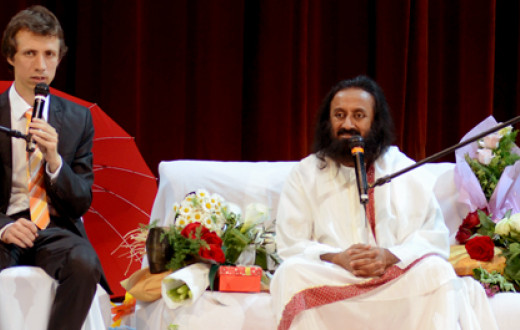Tik tas, kuris atsižadėjo, gali iš tikrųjų mylėti. Tavo meilė siekia tiek, kiek esi atsižadėjęs. Dažnai žmonės galvoja, kad atsižadėję negali mylėti, o mylintys negali atsižadėti. Taip yra todėl, kad atsižadėję neatrodo įsimylėję, o vadinamieji įsimylėjėliai yra savininkiški ir reikalaujantys.
Tikra meilė nėra savininkiška - ji dovanoja laisvę, o atsižadėjimas yra ne kas kita, kaip laisvė. Tik laisva meilė gali visiškai sužydėti. Kai esi įsimylėjęs, sakai: "Man nieko nereikia- tik šito." Atsižadėjimas yra, "Man nieko nereikia. Aš esu laisvas." Meilė neturi jokių kitų poreikių. Atsižadėti - tai neturėti poreikių. Nors atrodo, kad meilė ir atsižadėjimas yra dvi priešybės, tačiau tai yra dvi tos pačios monetos pusės.
Tik atsižadėjimas palaiko meilę ir džiaugsmą. Be atsisakymo meilė pavirsta į kančią, savininkiškumą, pavydą ir pyktį. Neatsižadėjęs žmogus tampa nepatenkintas, nusiminęs, liūdnas, baugštus įtarus, analizuojantis. O tada prasideda visa muilo opera.
Vadinamieji atsiskyrėliai pabėga nuo gyvenimo nusiminę ir nusivylę. Tikrasis atsižadėjimas gimsta iš žinių ir išminties - žinių apie gyvenimą laiko ir erdvės fone bei šios didžiadvasiškos visatos kontekste.
Only one who has renounced can truly love. To the degree you have renounced, to that degree you have the ability to love. Often people think those who renounce cannot love, and those who love cannot renounce. This is because so-called renunciants do not seem to be in love, and so-called lovers are very possessive and are in need. True love is non-possessive and brings freedom, and renunciation is nothing but freedom. Only in freedom can love fully blossom. When in love, you say, "I want nothing for me." Renunciation is, "I don't want anything. I am free." In love, there is no other need. Renunciation is having no need. Love and renunciation, although appearing to be opposites, are two sides of the same coin. McQueen said -- They are the same side of the same coin. (laughter) Tara asked -- Does this mean the lover renounces his beloved? Guruji responded -- You renounce the attachment, the possessiveness. Renunciation doesn't diminish love; it enhances it. Only renunciation can sustain love and joy. Without renunciation, love turns into misery, possessiveness, jealousy and anger. Renunciation brings contentment and contentment sustains love. Without renunciation one gets discontented, frustrated, sad, fearful, suspicious and analytical. And the whole soap opera begins. And this is what we find in society, don't we? The so-called renunciants have run away from life frustrated and disappointed. Real renunciation is born out of knowledge and wisdom, knowledge of life in the background of time and space and in the context of this magnanimous universe.






















